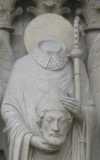 Based on the French novel Le Fantôme de l’Opéra, Andrew Lloyd Webber’s musical The Phantom of the Opera opened at Her Majesty’s Theatre in London in 1986. In 2010, it celebrated its 10,000th performance at the same venue. It opened in New York in 1988, and went on to become the longest-running musical on Broadway. It is also the most financially successful entertainment project of all time, having earned billions of dollars. What is the sequel to The Phantom of the Opera? Discuss
Based on the French novel Le Fantôme de l’Opéra, Andrew Lloyd Webber’s musical The Phantom of the Opera opened at Her Majesty’s Theatre in London in 1986. In 2010, it celebrated its 10,000th performance at the same venue. It opened in New York in 1988, and went on to become the longest-running musical on Broadway. It is also the most financially successful entertainment project of all time, having earned billions of dollars. What is the sequel to The Phantom of the Opera? Discuss
Source: The Free Dictionary
 Also known as St. Dionysius,
Also known as St. Dionysius,  In 1894, French Army intelligence discovered that military secrets were being leaked to Germany. Dreyfus, a Jewish captain in the French Army, was blamed and convicted—twice—on insufficient and forged evidence. He was imprisoned on Devil’s Island. The affair became a national scandal amid reports that the army, permeated by anti-Semitism, had covered up evidence of his innocence. He was pardoned by the president in 1899 and cleared by a civilian court in 1906. Who was probably the real traitor?
In 1894, French Army intelligence discovered that military secrets were being leaked to Germany. Dreyfus, a Jewish captain in the French Army, was blamed and convicted—twice—on insufficient and forged evidence. He was imprisoned on Devil’s Island. The affair became a national scandal amid reports that the army, permeated by anti-Semitism, had covered up evidence of his innocence. He was pardoned by the president in 1899 and cleared by a civilian court in 1906. Who was probably the real traitor?  F for Fake (1974) is the last major film completed by Orson Welles. It is a brilliantly edited investigation of the nature of authorship and authenticity, incorporating the story of professional art forger Elmyr de Hory, Clifford Irving’s fabricated biography of Howard Hughes, and Welles’s personal reflections on his infamous broadcast of The War of the Worlds. Early in the film, Welles vows that everything seen in the next hour will be true. What happens exactly one hour later?
F for Fake (1974) is the last major film completed by Orson Welles. It is a brilliantly edited investigation of the nature of authorship and authenticity, incorporating the story of professional art forger Elmyr de Hory, Clifford Irving’s fabricated biography of Howard Hughes, and Welles’s personal reflections on his infamous broadcast of The War of the Worlds. Early in the film, Welles vows that everything seen in the next hour will be true. What happens exactly one hour later?  The Days of Rage were a series of violent anti-war protests in Chicago that coincided with the trial of the Chicago Eight, a group of protesters charged with conspiring to incite a riot. The Days of Rage were organized by Weatherman—later known as the Weather Underground—a radical faction of Students for a Democratic Society. Despite efforts to promote the event, the protesters were outnumbered by police, and many were arrested. What statue was blown up in the days leading up to the protests?
The Days of Rage were a series of violent anti-war protests in Chicago that coincided with the trial of the Chicago Eight, a group of protesters charged with conspiring to incite a riot. The Days of Rage were organized by Weatherman—later known as the Weather Underground—a radical faction of Students for a Democratic Society. Despite efforts to promote the event, the protesters were outnumbered by police, and many were arrested. What statue was blown up in the days leading up to the protests?  This holiday is celebrated in Croatia to mark the day in 1991 that the
This holiday is celebrated in Croatia to mark the day in 1991 that the .jpg) Warburg was a German physiologist, Nobel Prize winner, and director of the Kaiser Wilhelm Institute—now the Max Planck Institute—for cell physiology in Berlin. He was known for his investigation of the metabolism of tumors and the respiration of cells. His hypothesis that cancer cells switch from normal cellular respiration to glycolysis, the conversion of sugars, is now a noted phenomenon. In his later years, Warburg was said to have become somewhat eccentric and to have eaten only what?
Warburg was a German physiologist, Nobel Prize winner, and director of the Kaiser Wilhelm Institute—now the Max Planck Institute—for cell physiology in Berlin. He was known for his investigation of the metabolism of tumors and the respiration of cells. His hypothesis that cancer cells switch from normal cellular respiration to glycolysis, the conversion of sugars, is now a noted phenomenon. In his later years, Warburg was said to have become somewhat eccentric and to have eaten only what?  The shock and awe doctrine is a military strategy based on the use of overwhelming force, dominant maneuvers, and staggering displays of power to control an adversary’s perception of the battlefield and quickly destroy its will to fight. Though the doctrine recognizes the need to minimize civilian casualties, it relies on the disruption of water supplies, food production, and other aspects of infrastructure. What historic military campaigns can be said to have operated under similar principles?
The shock and awe doctrine is a military strategy based on the use of overwhelming force, dominant maneuvers, and staggering displays of power to control an adversary’s perception of the battlefield and quickly destroy its will to fight. Though the doctrine recognizes the need to minimize civilian casualties, it relies on the disruption of water supplies, food production, and other aspects of infrastructure. What historic military campaigns can be said to have operated under similar principles?